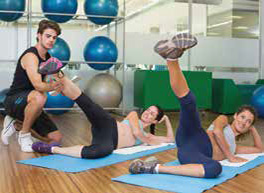
If you are undertaking a physical therapy program for knee pain or injury, it might strike you as odd that so much focus is put on increasing strength and flexibility in your hips. After all, your hips aren’t the problem. But here’s something you may not know: While your pain and difficulty moving may be concentrated in your knee, your hips may actually be implicated in the condition.
Recent studies have looked more closely at the relationship between weak hips and knee problems such as patellofemoral pain syndrome (PFPS; runner’s knee), iliotibial band syndrome, patellar tendonitis (jumper’s knee) and more. Research has linked weak hip muscles to these problems, most likely because weak hips lead to poor walking and running form. If the hips don’t maintain proper alignment when the legs are in motion, undue stress is put on the knees. Over an extended period of time, this can lead to serious knee conditions. Additionally, the recent focus on “core work” might mean that people are neglecting the important hip muscles in favor of exercises that work the abdominal core.
One recent study demonstrated that a twice-weekly hip-strengthening program reduced—or even eliminated—PFPS in female runners. Other studies have found that runners with knee injuries are far more likely to present with weaker hips, suggesting that the weak muscles may have contributed to the injury.
Non-weight–bearing exercises that strengthen and stretch the muscles surrounding your hips may be the answer to eliminating your knee pain. Most hip-strengthening protocols call for exercises such as the side leg lift, “clam” leg lift and back bridge (lying on a mat or table on your back with your legs bent at the knees and lifting your buttocks off the mat) to be performed on a daily basis for one to three sets of 15 to 30 repeats—usually building up over time as your strength increases.
Keep in mind that the body is a complex machine, and even if it doesn’t make sense to you, these hip exercises make perfect sense to us—and to your grateful knees. Of course, every person is different. If you suffer from knee pain, call our office for an appointment. We can assess your pain and design an individualized program of exercises to strengthen your hips and ease the pain in your knees so that you can get back to enjoying your favorite activities.


















